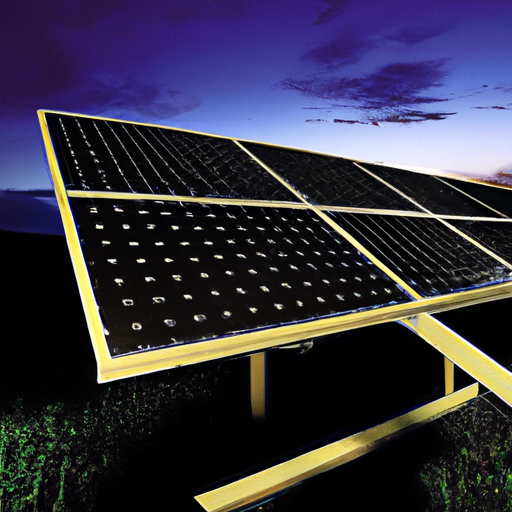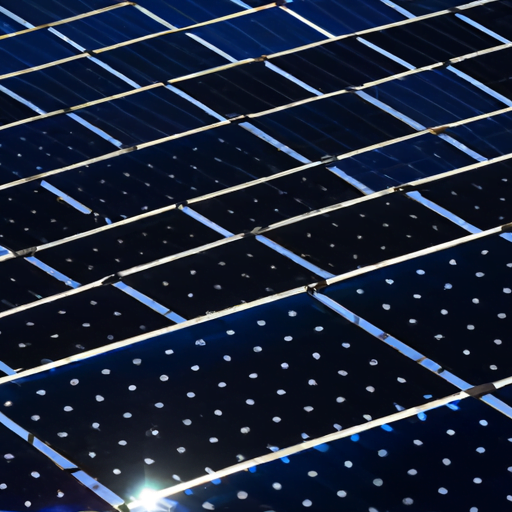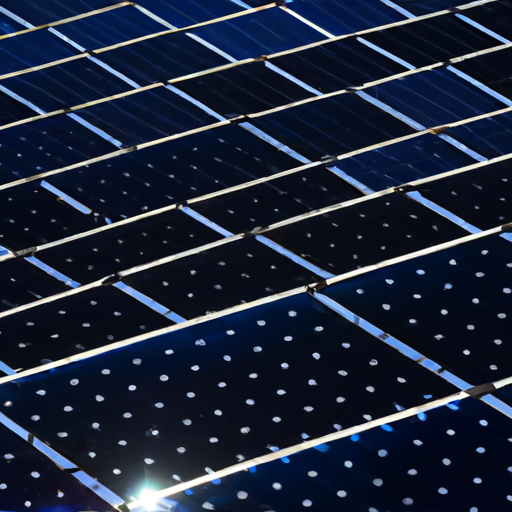So, have you ever wondered if solar panels can charge at night? It’s a pretty interesting question, considering that solar panels rely on sunlight to generate electricity. Well, the short answer is no, solar panels cannot charge at night. But don’t worry, there’s more to it than just a simple yes or no.
You see, solar panels work by converting sunlight into electricity through a process called the photovoltaic effect. When sunlight hits the solar panels, it allows the electrons in the semiconductors to flow and create an electric current. This current is then stored in batteries or used to power your appliances. But once the sun goes down, there’s no more sunlight to fuel this process, which means the panels can’t generate electricity.
However, there are ways to still have power at night. One popular option for those living off the grid is to install a solar battery storage system. These batteries can store excess electricity generated during the day and release it at night when the panels are no longer producing power. This way, you can use solar energy even when the sun is not shining.
So, while solar panels may not be able to charge at night, there are definitely solutions available to ensure a consistent power supply. Want to learn more about living off the grid and solar power? Stay tuned for our next article where we’ll dive deeper into this fascinating topic.
Introduction
Understanding solar panels and their function
Solar panels are becoming increasingly popular as a source of renewable energy. They harness the power of the sun’s rays and convert it into electricity, making them a clean and sustainable alternative to traditional energy sources. However, there is a common misconception that solar panels can only generate electricity during daylight hours. In this article, we will explore whether solar panels can indeed charge at night and examine alternative solutions for round-the-clock energy.
Solar Panels and Daylight
The process of solar panel charging during daylight
Solar panels work by capturing sunlight and converting it into electricity through a process known as the photovoltaic effect. When sunlight hits the solar cells within the panel, it excites the electrons, causing them to flow and create an electric current. This electricity can then be used to power appliances and devices.
During daylight hours, solar panels are most effective at charging due to the abundance of sunlight. The intensity of sunlight directly affects the amount of electricity generated by solar panels. As the sun’s angle changes throughout the day, the amount of sunlight the panels receive varies, impacting their charging efficiency.
How sunlight is converted into electricity
Solar panels are made up of multiple solar cells, typically composed of silicon. When sunlight hits these cells, photons in the sunlight knock electrons loose from atoms, resulting in a flow of electric current. Each solar cell generates a small amount of electricity, but when many cells are combined into a panel, they can produce enough power to meet the energy demands of a household or facility.
Efficiency of solar panels during daylight
Solar panels are designed to be most efficient when exposed to direct sunlight. However, even on cloudy or overcast days, solar panels can still generate electricity, although at a reduced efficiency. The efficiency of solar panels is measured by their ability to convert sunlight into usable electricity. Higher efficiency panels can produce greater amounts of electricity with the same amount of sunlight.

The Need for Charging at Night
Reasons for wanting solar panels to charge at night
There are several reasons why individuals may want solar panels to charge at night. One reason is to have a continuous supply of electricity. Although solar panels can generate excess electricity during the day, this energy is typically stored in batteries for use during nighttime hours. However, in situations where battery storage is limited or insufficient, the ability to charge solar panels at night becomes crucial.
Another reason for wanting solar panels to charge at night is to mitigate power outages. If there is a disruption in the main power grid, having solar panels that can charge at night ensures a reliable backup supply of electricity. This can be particularly important in remote locations or areas prone to frequent power outages.
Scenarios where night charging may be required
Night charging may be necessary in various scenarios. For instance, for individuals living in areas with limited daylight hours during certain seasons, such as high latitudes or regions with long winter nights, solar panels that can charge at night become essential.
In addition, in emergency situations where immediate access to power is crucial, such as during natural disasters or power grid failures, having solar panels that can charge at night can provide a lifeline for critical appliances and communication devices.
Solar Panels and Darkness
How solar panels work in darkness
In complete darkness, solar panels are unable to generate electricity through the photovoltaic effect. Without sunlight, there is no source of energy to excite the electrons within the solar cells. Therefore, solar panels alone cannot charge at night.
The absence of sunlight and its impact on charging
The absence of sunlight has a significant impact on the charging capabilities of solar panels. Without sunlight, the flow of electrons is halted, and the solar panels cease to produce electricity. This means that solely relying on solar panels for nighttime charging is not feasible.
Challenges faced by solar panels in low light conditions
Even in low light conditions, such as early morning or late afternoon, solar panels may experience reduced efficiency due to the limited amount of sunlight available. Cloud cover, shade from buildings or trees, and atmospheric factors can further reduce the amount of sunlight reaching the panels, impacting their charging capabilities. Additionally, solar panels require direct exposure to sunlight to generate electricity effectively. Indirect or diffused light is less effective at charging the panels.

Alternative Sources of Energy
Exploring other energy sources for nighttime charging
While solar panels alone cannot charge at night, there are alternative sources of energy that can be utilized. One option is to connect solar panels to a battery storage system. During daylight hours, excess electricity generated by the solar panels can be stored in batteries for later use. This stored energy can then be discharged during the night to power appliances and devices.
Another alternative is to combine solar panels with other renewable energy sources, such as wind turbines or hydroelectric systems. By diversifying the sources of energy, the reliance on solar panels alone can be reduced, ensuring a continuous supply of electricity even during nighttime hours.
Battery storage and backup systems
Battery storage systems play a crucial role in enabling solar panels to provide nighttime charging. These systems store excess electricity generated by the solar panels during daylight hours and release it when the panels are no longer producing electricity. By storing energy in batteries, individuals can utilize solar power even when the sun is not shining.
Battery backup systems are particularly useful during power outages. They provide a reliable source of electricity for critical appliances and devices, ensuring that essential functions are not disrupted during nighttime hours.
Advancements in Solar Technology
Innovations to enhance solar panel performance in low light
Researchers and engineers are continually working on developing innovative solutions to enhance solar panel performance in low light conditions. One such advancement is the development of specialized solar cells that are more efficient at capturing sunlight in low light environments. These cells absorb a broader range of light wavelengths, allowing them to generate electricity even in low light conditions.
Emerging technologies for night solar charging
There are emerging technologies that aim to make solar panels capable of charging at night. For instance, the concept of “nighttime solar” involves capturing and utilizing residual ambient light during nighttime hours. While still in the experimental phase, these technologies have the potential to revolutionize the capabilities of solar panels and unlock the ability to charge at night.
Solar Panel Efficiency
Factors affecting solar panel efficiency
Several factors can impact the efficiency of solar panels. The angle and orientation of the solar panels relative to the sun play a crucial role in maximizing their charging capabilities. Ensuring that the panels are positioned to receive the maximum amount of sunlight throughout the day can significantly improve their efficiency.
Additionally, the quality and condition of the solar panels themselves can affect their efficiency. Over time, dust, dirt, and debris can accumulate on the panels, reducing their ability to capture sunlight. Regular maintenance and cleaning can help optimize the performance of solar panels.
Choosing high-efficiency solar panels
When selecting solar panels, it is essential to consider their efficiency ratings. Higher efficiency panels can generate more electricity per unit of sunlight, maximizing their charging capabilities. While high-efficiency panels may come at a higher cost, they can provide a greater return on investment over time through increased electricity production.
Myths and Misconceptions
Common myths about solar panels charging at night
There are several common myths surrounding the idea that solar panels can charge at night. One such myth is that solar panels can generate electricity from moonlight. While moonlight is a reflection of sunlight, it is significantly dimmer and lacks the intensity required to generate electricity.
Another myth is that leaving electronics connected to solar panels overnight will result in a full charge by morning. As mentioned earlier, solar panels alone cannot generate electricity at night, so leaving electronics connected overnight will not result in charging.
Clarifying misconceptions with scientific evidence
Scientific evidence confirms that solar panels cannot charge at night without a supplemental energy source, such as battery storage. The absence of sunlight prevents the photovoltaic effect from occurring, halting the flow of electrons and ceasing the production of electricity. It is essential to rely on alternative sources of energy or storage systems for nighttime charging purposes.
The Role of Battery Systems
Connecting solar panels with battery storage
Battery systems play a vital role in enabling solar panels to provide nighttime charging capabilities. These systems allow excess electricity generated during daylight hours to be stored for later use. Connecting solar panels to battery storage systems ensures a reliable supply of electricity during nighttime hours.
Utilizing stored energy for nighttime usage
Stored energy in battery systems can be utilized during nighttime hours or when solar panel output is low. By tapping into the stored energy, individuals can power their appliances, lighting, and other devices, even when solar panels are unable to generate electricity. This ensures a continuous and stable source of power for daily needs, regardless of the time of day.
Conclusion
Understanding the limitations of solar panels in nighttime charging
While solar panels are a highly efficient and clean source of energy during daylight hours, they are unable to generate electricity at night without supplemental energy sources. The absence of sunlight prevents solar panels from producing electricity, making alternative sources of energy or storage systems necessary for nighttime charging.
Exploring alternative options for round-the-clock energy
To achieve round-the-clock energy independence, combining solar panels with battery storage systems or utilizing other renewable energy sources is crucial. Battery storage enables the excess electricity generated during the day to be stored for nighttime use, while the use of additional renewable energy sources diversifies the energy supply, ensuring continuous power even during nighttime hours. As technology continues to advance, there may be future innovations that allow solar panels to charge at night, unlocking further opportunities for sustainable energy generation.




